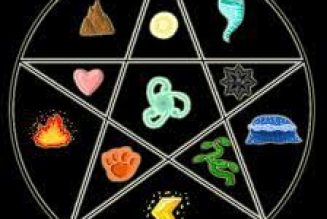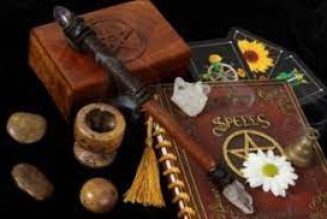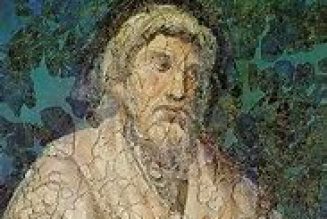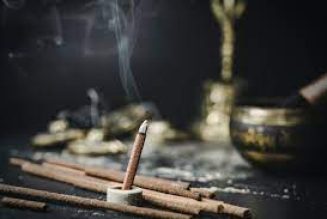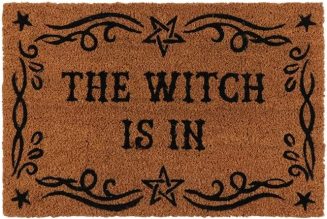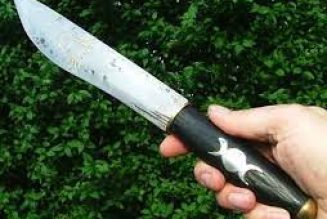Aleister Crowley earns a place in witchcraft, not because he was a witch, but because he was not !
This, of course, does not stop Crowley’s name being dragged into every Sunday newspaper’s latest “Exposure of Witchcraft and Black Magic” (they seldom know the difference).
But perhaps if a brief sketch of Crowley’s life is given here, it may help to a better understanding of what this very remarkable man really stood for.
Crowley was a pagan, a poet, a mountaineer, a magician and a prophet.
He was also a world traveller and an all too daring explorer of the dangerous inner world of hallucinatory drugs.
But the magic he practised-or ‘ Magick’ as he preferred to call it-was the Qabalistic magic taught by the Order of the Golden Dawn, the famous occult brotherhood which claimed descent from the original Rosicrucians.
In Crowley’s eyes at any rate, it was very definitely white ‘Magick’ ; and it was not witchcraft of any description.
As a matter of fact, Crowley was rather afraid of witchcraft, judging from some of the references to it in his works.
This was probably because he recognized the strong feminine influence in witchcraft, and Crowley distrusted and professed to despise women.
There was a pronounced homosexual bias in his nature and his deepest and most significant relationships were with men.
As a poet, Crowley has never yet received the recognition he deserves. Like Oscar Wilde, his love of shocking the smug bourgeoisie rebounded upon him, to rob his work of the praise it merited.
Today, however, in more broad-minded times, more and more of Crowley’s books are being reprinted and made available, so that people can appreciate his strange genius for themselves, instead of only being able to read shocked (and usually inaccurate) accounts of how ‘wicked’ he was.
For such a flamboyant character, Crowley had a surprising home background. He was the son of two devout members of the Plymouth Brethren sect, a wealthy brewer called Edward Crowley and his wife Emily.
They lived at Leamington Spa, Warwickshire, in the utmost Victorian respectability; and there Aleister Crowley was born, on 1 2th October 1 875.
Perhaps they were rather too devout and respectable. Their talented little son was stifled and suffered in an atmosphere of narrow-minded creedalism ; and when he rebelled, his mother told him that he was as bad as the Great Beast in the Book of Revelations!
This seems to have stuck in Crowley’s mind; because when he became a man he took the title of the Great Beast-even to the extent of having it printed on his visiting cards.
His whole life was a revolt against his parents and everything they stood for. They must have made him very unhappy-no doubt with the best of intentions.
Crowley inherited a substantial fortune from his father. He went to Trinity College, Cambridge; and having utterly rejected his parents’ religion, he became interested in the occult.
Eventually, he joined the Hermetic Order of the Golden Dawn, which numbered many distinguished people among its initiates.
He also travelled extensively in the East, learning Eastern systems of Yoga and occultism.
The leader of the Golden Dawn was another remarkable personality,S. L. MacGregor Mathers; and he and Crowley ended by quarrelling bitterly.
Crowley thereafter went his own way and founded his own order, the Argentinum Astrum or Silver Star, abbreviated to A.A.
Crowley had married Rose Kelly, the sister of Sir Gerald Kelly, the artist. While on holiday in Egypt with his young wife, Crowley took part with her in magical rituals, as a result of which he received what he considered to be a message from the gods who rule the destiny of this planet.
This message was dictated to him by what he called “preterhuman intelligence”.
He wrote down three chapters of a manuscript, which he named Liber Legis, the Book of the Law.
From the Book of the Law Crowley took his famous dictum: “Do what thou wilt shall be the whole of the Law. Love is the Law, Love under Will”.
Upon this manuscript, Crowley based all of his subsequent life and teachings. Liber Legis is an extraordinary document.
However much it may be argued that it actually emanated from Crowley’s subconscious mind, nevertheless it is undeniable that this book contained prophecies, both about Crowley’s own personal life and about world events, which have been fulfilled.
Crowley received the Book of the Law in April 1 904. The world was then in the palmy days of the British Empire, the lower classes knew their place, and all was peace, prosperity and croquet on the lawn. The Book of the Law proclaimed that all this was going to dissolve into war and chaos, out of which a new Aeon was to arise.
The orthodox religions of the world would become discredited; the accepted moral codes would be despised. A new order of things had begun. It was the Equinox of the Gods.
The new Aeon would be called the Aeon of Horus because it was going to be an Aeon of youth. Horus is the Egyptian god who was the child of Isis and Osiris.
The law set forth in Liber Legis would be the guiding light of the new Aeon, and Crowley was to proclaim it. Crowley has often been called a charlatan, but he undoubtedly devoted the rest of his life to play out his role of the Logos of the Aeon of Horus. He believed in what he was doing; and no amount of personal misfortune, loss, or the alienation of his friends and those dear to him, would turn him from his path.
Crowley was a figure of fate; he has made his mark upon the world, and particularly the world of the occult.
The press denounced him as “The Wickedest Man in the World”, because of what they alleged went on in his notorious ‘Abbey of Thelema’ which he established at Cefalu in Sicily.
It is now known that a good deal of the allegations made was false. However, Mussolini, who was then ruler of Italy, expelled him from Sicily, and he returned to Britain. Here he became involved in a famous and sensational libel case.
He sued Nina Hamnett, the sculptress, alleging that in her book of reminiscences, Laughing Torso (Constable and Co., London, 1932), she had libelled him by saying that he practised black magic.
The case was heard in April 1 934 before Mr. Justice Swift. The other side was able to produce such extraordinary evidence of Crowley’s bizarre life and scandalous writings, that the judge was horrified.
Of course, Crowley lost the case, amid a new furore of press publicity, and was forced into bankruptcy.
A number of disciples, however, remained loyal to him and helped him in his declining years.
He ended his stormy life quietly in retirement at Hastings, in Sussex; unrepentant and unbowed. He died peacefully in his bed on 1 st December 1947.
His remains were cremated at Brighton, and the ashes sent to his disciples in America. To the horror and indignation of Brighton councillors, Crowley’s “Hymn to Pan” had been proclaimed from the pulpit of the crematorium chapel, with other extracts from his writings, instead of the usual religious service.
The worst charge that can be levelled against Crowley concerns the effect that he had upon some of his close associates.
There were cases of mental collapse, alcoholism, broken lives and suicide among his devotees.
His ‘Magick’ was strong and dangerous stuff. But he meant it to be white Magick ; and although it was paganism, it was not witchcraft.
An excellent biography of Aleister Crowley is The Great Beast by John Symonds (Riders, London, 1951 and St. Martin’s Press, New York, 1972).
A shorter, but also very enlightening book about him, is Aleister Crowley by Charles Richard Cammell (New English Library, London, 1 969, and by Hill and Wang, New York, 1970).
Still more recently, Dr Francis Israel Regardie, who at one time was Crowley’s personal secretary, has written The Eye in the Triangle; An Interpretation of Aleister Crowley (Llewellyn, U.S.A., 1 970).
